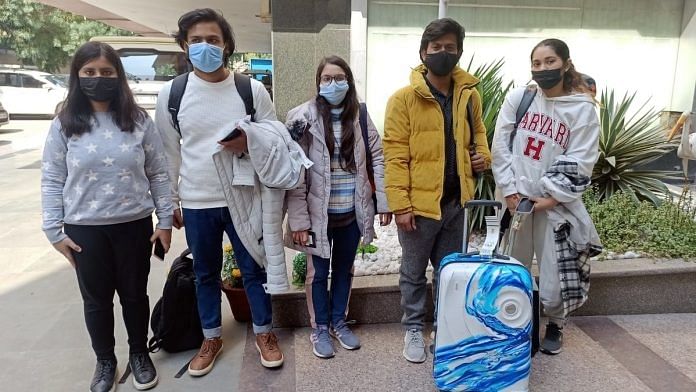New Delhi: The two years that Kolkata resident Hamza Kabir spent studying medicine at the Uzhhorod National University in Ukraine were quite happy. “People there are very nice,” he said. That’s why nothing could have ever prepared him for the “hostility” he faced as he was leaving the country via the Hungary border in a bus that his university had arranged.
“There was checking at the border, we kept waiting in the bus. They told us ‘you can buy food, use the washroom…’ But we were having problems (in exchanging currency). Then, as we started leaving the country, armed gunmen walked up to us and said: ‘Why are you leaving the country? Why is India doing this? Why don’t you join us and fight?’” recounted Kabir.
This was immediately after India abstained during a United Nations Security Council resolution last week on the Russia-Ukraine war, which has gone on for nearly a week now and is threatening to unravel global security.
“I did not want to argue with them. I said ‘Tobo Bachino’ in my broken Ukrainian, which basically means ‘farewell’…” Kabir said. “Some of my friends, people I used to play basketball with, have joined them (Ukrainian forces), I have heard.”
Kabir is part of one of several batches of students evacuated from Ukraine by the Government of India. Students from West Bengal are currently lodged in Delhi’s Banga Bhawan on their way back home, and are waiting for the state government to hand them flight tickets to get back home.
There are uncertainties now about what the future holds but Kabir is hoping that, maybe after his college break ends on 13 March, he will be able to rejoin his course. “I have to go back, education is important,” he said.
His batchmate Tiyasha Biswas, a student of Ivan Franko National University of Lviv, is hopeful that even if they cannot go back to Ukraine, the students might be allowed to finish their medical education in one of Ukraine’s neighbouring countries, such as Poland, Hungary and Romania.
Biswas got a bruised shoulder in a scuffle at the border where thousands of people were jostling to get out of the country.
“We arranged for a taxi and went to the Poland border along with our friends. We had to walk 16 km at -5°C temperature because, after a point, the taxi said it could not go any further,” said the Barasat resident. “We walked almost for 11 hours before reaching the border but at the border we had to wait for two hours as Ukraine residents were prioritised for evacuation. There was discrimination. There were no Indian officials there who could push our case.”
Her mother Shibani spoke about the difficulty families like hers faced in reaching government officials and telling them about the hardships the children were facing.
Also read: West’s bid to shut down Russian economy normally an ‘act of war’, says India’s ex-envoy to Moscow
Jostling at the borders
Nistha, another student in Lviv, spoke about how armed Ukrainian border guards “kept pushing students”, saying “go back”, when they were queuing up at the Medyka border to leave the country and enter Poland, where Indian officials had arranged Polish visas.
“The guards were particularly vicious with the Nigerians there. Sometimes they were chasing them away,” said Nistha.
Kalsang, a student from Darjeeling who is also studying in Lviv, said she booked a private cab along with friends to reach the border but the journey proved arduous.
“The cab told us that, from the drop-off point, the border was a distance of 5 km but that was not the case. We had to travel 40-45 km by foot to reach the border,” she added. “A girl in my group fainted because of hypothermia. We called the ambulance for her and we stayed the night in a jungle at -5°C,” said Kalsang.
“We did not even have proper clothes because we had expected to reach the border much earlier. Meanwhile, the friend who had hypothermia was sent back on foot. She walked 20 km to the border,” she added. “In the morning, they started making groups of girls but the Nigerians broke the order and tried to run ahead. The Ukrainian army opened fire with airguns. The Nigerians tried to get into the bus but the police stopped them.”
Kalsang said “there were huge crowds at all points”. “There was jostling, lathicharge. Even at the Poland border, there were huge queues for the stamping but there was again jostling,” she added. “I got hurt in my foot during that melee.”
(Edited by Amit Upadhyaya)
Also read: Russia-Ukraine information warfare is following century-old playbook, dating back to WW1



